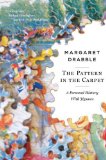Summary | Excerpt | Reading Guide | Reviews | Beyond the Book | Readalikes | Genres & Themes | Author Bio

A Personal History with Jigsaws
by Margaret Drabble
This was dangerous terrain, and I should have been more wary
about entering it, but my resistance was low. I told myself that there
was nothing dangerous in my relationship with my aunt, and that
my thoughts about her could offend nobody, but this was stupid of
me. Any small thing may cause offence. My sister Susan, more
widely known as the writer A. S. Byatt, said in an interview somewhere
that she was distressed when she found that I had written
(many decades ago) about a particular teaset that our family
possessed, because she had always wanted to use it herself. She felt
I had appropriated something that was not mine. And if a teapot
may offend, so may an aunt or a jigsaw. Writers are territorial, and
they resent intruders.
I fictionalized my family background in a novel titled The
Peppered Moth, which is in part about genetic inheritance. I scrupulously
excluded any mention of my two sisters and my brother, and
I suspect that, wisely, none of them read it, but I was made
conscious of having trespassed. This made me very unhappy. I
vowed then that I would not write about family matters again (a
constraint which, for a writer of my age, constitutes a considerable
loss) but as I sat at my dark table I began to think I could legitimately
embark on a more limited project that would include
memories of my aunt’s house. These are on the whole happy
memories, much happier than the material that became The
Peppered Moth. I wanted to rescue them. Thinking about them
cheered me up and recovered time past.
But my new plan posed difficulties. I could not truthfully
present myself as an only child (as some writers of memoirs have
misleadingly done) and I have had to fall back on a communal
childhood ‘we’, which in the following text usually refers to my
older sister Susan and my younger sister Helen. My brother
Richard is considerably younger than me, and his childhood
memories of my aunt are of a later period, although he did spend
many holidays with her.
This book became my occupational therapy, and helped to pass
the anxious months. I enjoyed reading about card games, board
games and children’s books, and all the ways in which human
beings have ingeniously staved off boredom and death and despised
one another for doing so. I enjoyed thinking about the nature of
childhood and the history of education and play. For an hour or
two a day, making a small discovery or an unexpected connection,
I could escape from myself into a better place.
I don’t mean in these pages to claim a special relationship with
my aunt. My father once said to me, teasingly, ‘Are you such a
dutiful niece and daughter because you married into a Jewish family?’
And I think that the Swifts may have played a part in my
relationship with Auntie Phyl. I was captivated by the family of
my first husband, Clive Swift. He was the first member of his
generation to marry out, but despite this I was made welcome. I
loved the Swifts’ strong sense of mutual support and their demonstrative,
affectionate generosity. They were a powerful antidote to
the predominantly dour and depressive Yorkshire Drabbles and
Staffordshire Bloors. It was a happy day that introduced me to
Clive and the Swifts.
In The Peppered Moth I wrote brutally about my mother’s
depression, and I never wish to enter that terrain again. It is too
near, too ready to engulf me as it engulfed her. Some readers have
written to me, taking me to task for being hard on my mother,
but more have written to thank me for expressing their complex
feelings about their own mothers. I had hoped that writing about
her would make me feel better about her. But it didn’t. It made me
feel worse.
Both my parents were depressive, though they dealt with this in
different ways. My father took to gardening and walking with his
dog, my mother to Radio 4 and long laments. He was largely
silent, though Helen reminds me that he used to hum a lot. My
mother could not stop talking. Her telephone calls, during which
she complained about him bitterly for hour after hour, seemed
never-ending. The last decades of their marriage were not happy,
but when they were on speaking terms they would do the Times
crossword together.
Excerpted from The Pattern in the Carpet by Margaret Drabble. Copyright © 2009 by Margaret Drabble. Excerpted by permission of Houghton Mifflin Harcourt. All rights reserved. No part of this excerpt may be reproduced or reprinted without permission in writing from the publisher.
Your guide toexceptional books
BookBrowse seeks out and recommends the best in contemporary fiction and nonfiction—books that not only engage and entertain but also deepen our understanding of ourselves and the world around us.